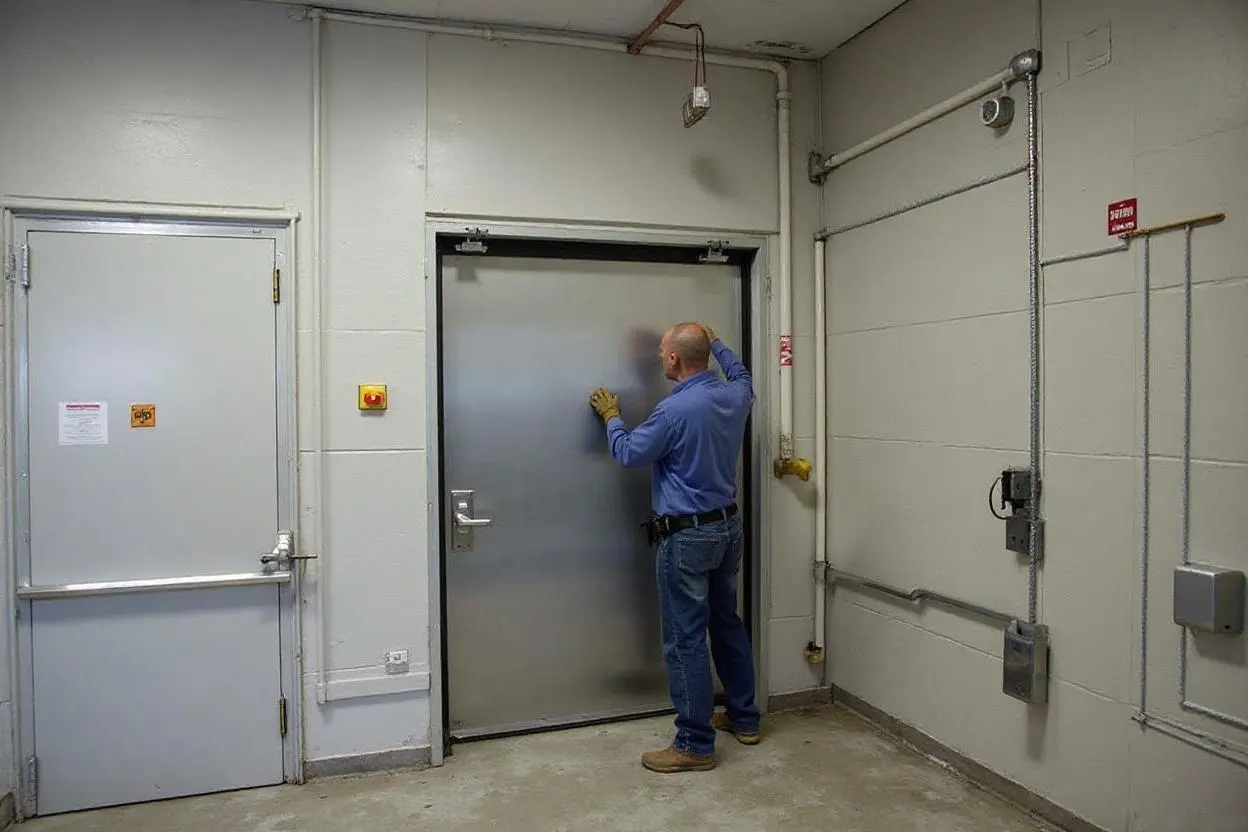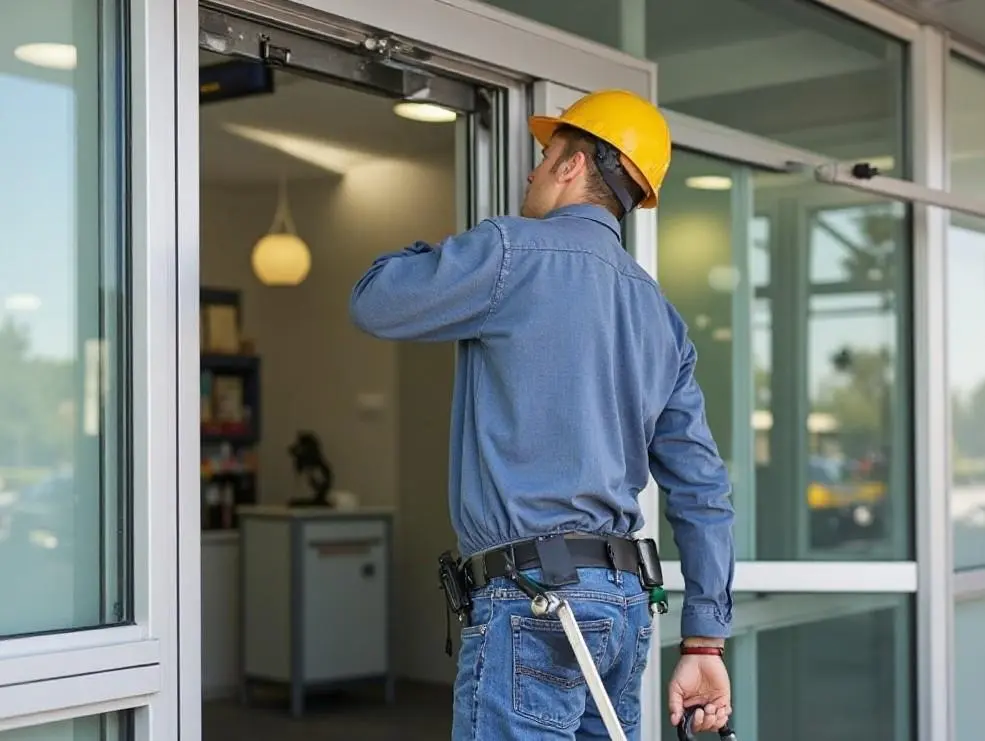Automatic Door Maintenance Contracts Buffalo: Are They Worth It?
Automatic doors are workhorses. In Buffalo, NY, they battle lake-effect snow, salt, wind gusts, and heavy daily traffic. A well-tuned door welcomes customers, keeps energy costs in check, and protects accessibility for everyone. The question many property managers ask is simple: does a maintenance contract pay for itself? In most cases, yes — if the contract is structured right and serviced by a reliable local team.
What a maintenance contract actually covers
A good automatic door maintenance contract focuses on safety, uptime, and cost control. It usually includes scheduled inspections, adjustments, lubrication, minor part replacements, and performance testing against ANSI A156.10 and A156.19 standards. For sliding, swinging, and ADA low-energy operators, techs check header components, sensors, door alignment, closing speeds, weatherstripping, and activation devices.
In Buffalo, technicians also address cold-weather issues. Salt attacks bearings and thresholds. Ice and slush collect in tracks. Door operators work harder in January than in June. Contracts that include seasonal tune-ups and quick response help prevent a small drag in a track from turning into a motor failure.
The real numbers: contract vs. reactive repairs
Here is how the math usually plays out for retail, healthcare, and office buildings in Western New York. A single emergency service call with parts can run $450 to $1,200, sometimes more if a header needs rebuilding or sensors fail. A seized track roller on a heavy sliding door can cost $600 to $900 including labor and downtime. Two to three unplanned incidents in a winter season are common for doors with no routine care.
A maintenance plan in Buffalo typically ranges from $25 to $75 per month per opening for standard storefront sliders or swing operators, depending on frequency and door count. Multi-site facilities get better rates. Many plans include two to four scheduled visits per year, discounted parts, and reduced emergency rates. If the plan prevents even one major failure and shortens emergency response, it pays for itself and protects revenue on busy days.
Safety and liability in high-traffic entries
Automatic doors are safe when sensors and controls stay within spec. sliding doors Problems arise when detectors drift out of alignment or doors close too fast. Slip hazards at the threshold add risk during snow events. A maintenance contract anchors documented inspections and adjustments. That record matters if there is an incident. It also supports compliance with ANSI standards and accessibility obligations.
Experienced technicians in Buffalo test approach sensors, safety beams, presence detection, hold-open times, and closing forces with the right instruments. They remove salt buildup, re-seat seals, and verify that doors break out properly for egress. This is not busywork — it prevents injuries and keeps insurance carriers satisfied.
Energy costs add up in Buffalo winters
A misaligned slider that fails to close tight wastes heat every minute. In subfreezing weather, a 1-inch gap across a 7-foot opening can bleed hundreds of dollars in energy costs over a season. Regular maintenance fixes seals, guides, and timing so doors open only as wide as needed and close promptly. For buildings with vestibules, coordinated door timing matters. The right setup reduces stack effect and keeps warm air inside on windy days along Lake Erie.
Signs your door needs more than reactive repairs
A property manager can spot trouble early. Dragging noises, slow starts, false openings from wind, doors that bounce on close, or error codes on the operator panel point to deeper issues. If a door trips offline during cold snaps or after snowstorms, odds are high that water and salt have reached moving parts. A contract converts these “nuisance” symptoms into scheduled fixes instead of high-priced emergencies.
What a Buffalo-specific maintenance visit looks like
Skilled techs arrive with cold-rated lubricants, sensor calibration tools, spare rollers, belts, brushes, and seals commonly used on record, Stanley, Horton, ASSA ABLOY, and Tormax systems. They clean tracks, check belt tension, verify operator amperage draw, test door speeds, confirm approach and safety zones, and tune for wind conditions. In winter, they clear ice near thresholds and confirm the sweep and brush seals contact evenly. In spring, they clear grit left from road salt. That seasonal rhythm is the difference between “it works” and “it works all year.”
Are contracts worth it for small sites?
For a single storefront with one automatic slider, the value depends on hours of operation, traffic, and exposure to weather. A bakery on Elmwood with steady foot traffic and a west-facing entrance that takes wind will benefit from two preventative visits per year and priority service. A low-traffic office with a protected vestibule may choose an annual plan with on-call support. The objective is to match maintenance frequency to risk, not to buy the biggest plan.

Common pitfalls and how to avoid them
Some contracts look cheap but exclude the parts that fail most: rollers, guide shoes, and sensor lenses. Others skip ANSI testing or charge full emergency rates even for contracted doors. The best agreements are clear about what is included, how fast the team responds, and which safety tests they document.
A-24 Hour Door National Inc recommends asking for proof of factory training, references from similar Buffalo properties, and a sample inspection report. It should show door speeds, sensor test results, and the ANSI checks. This level of detail protects your building and your budget.
Contract features that matter in Buffalo, NY
- Seasonal tune-ups tied to winter readiness and spring salt cleanup
- Priority response with true 24/7 coverage during storms and holidays
- Documented ANSI A156.10/A156.19 testing and written reports
- Discounted parts for high-wear items and an on-truck stock list
- Multi-door pricing for buildings with several entrances or campuses
What property managers ask most
How often should automatic doors be serviced in Buffalo? For exterior sliders and swing operators, quarterly is ideal through winter months. Semiannual can work for protected entries with lighter traffic.
Will a maintenance plan cover sensors? Good plans include cleaning, alignment, and calibration. Replacement sensors are usually discounted but billed separately.
How fast is emergency response during a snowstorm? A local team with stocked trucks can reach most Buffalo neighborhoods in 2 to 4 hours. During extreme events, contract clients move to the front of the line.
Do contracts extend door life? Yes. Keeping rollers true, belts tensioned, and thresholds clean reduces motor strain. That can add two to five years to operator life, based on usage and environment.

A quick self-check between visits
- Listen for grinding, scraping, or irregular start-stop behavior
- Watch the door close speed; it should be smooth without bounce
- Check that the door opens only as wide as needed for traffic
- Confirm safety sensors stop the door when someone stands still in the path
- Clear snow, ice, and salt away from tracks and thresholds after each storm
Why choose a local maintenance partner
Automatic door maintenance benefits from geography. A Buffalo-based crew understands lake-effect timing, uses lubricants that perform below freezing, and sets wind profiles that prevent false openings. They stock parts for brands common in Upstate New York and know which sensors resist glare from snowfields. That practical experience reduces callbacks and protects uptime during heavy retail weekends and clinic mornings.
A-24 Hour Door National Inc services automatic sliders, swing operators, telescoping doors, and ADA low-energy operators across Buffalo, Amherst, Cheektowaga, Tonawanda, West Seneca, and nearby suburbs. The team documents every visit, aligns settings for local conditions, and stays ready 24/7.
Bottom line: are maintenance contracts worth it?
For most Buffalo properties with exterior automatic doors, yes. A well-structured contract reduces emergency costs, limits liability, stabilizes energy usage, and keeps doors safe and welcoming through harsh winters. The key is fit. Match visit frequency to your entry’s exposure and traffic, verify ANSI testing, and insist on transparent reporting.
Ready to compare plan options for your site? Contact A-24 Hour Door National Inc for a quick assessment, pricing by door count, and a seasonal maintenance schedule that fits Buffalo weather and your hours of operation. Call now to schedule an on-site evaluation or request a same-week tune-up before the next cold snap.
A-24 Hour Door National Inc provides commercial and residential door repair in Buffalo, NY. Our technicians service and replace a wide range of entry systems, including automatic business doors, hollow metal frames, storefront entrances, fire-rated steel and wood doors, and both sectional and rolling steel garage doors. We’re available 24/7, including holidays, to deliver emergency repairs and keep your property secure. Our service trucks arrive fully stocked with hardware, tools, and replacement parts to minimize downtime and restore safe, reliable access. Whether you need a new door installed or fast repair to get your business back up and running, our team is ready to help. A-24 Hour Door National Inc
344 Sycamore St Phone: (716) 894-2000 Website: https://a24hour.biz/buffalo
Instagram: @a24hourdoor
Buffalo,
NY
14204,
USA
Facebook: 24 Hour Door
Yelp: A-24 Hour Door National (Buffalo)
X (Twitter): @a24hrdoor